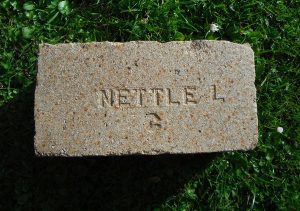
- Stein, Castlecary Fireclay Works, Castlecary, Stirlingshire.
- Stein, Manuel Firebrick and Refractory Works, Whitecross, Stirlingshire.
- Stein & Co, Anchor Brickworks, Denny, Stirlingshire.
- Milnquarter Fireclay & Gannister Works, Bonnybridge, Stirlingshire.
The information is below taken from a Stein brochure entitled “Rotary cement kiln refractories” located within the Falkirk Archives.
Maksiccar II cement – is suitable for jointing firebricks where a strong bond is required at all temperatures. This cement gives a strong bond over the whole joint, low permeability to gases and strong resistance to slag attack and abrasion. It is suitable for wash coating firebrick work. Supplied dry. Air sets. Maximum temperature of use 1650 degrees C. 2.5 gallons water required per cwt of cement.
Stein high alumina A.S cement – is particularly suitable for jointing our high alumina range of bricks. This cement contains approximately 55% alumina. Being air setting this cement gives a strong bond over the whole joint, with low permeability to gases and strong resistance to slag attack and abrasion. Supplied dry. Maximum temperature of use 1700 degrees C. 2.5 gallons water required per cwt of cement.
Stein magnesite cement No 2 – Stein magnesite cement is recommended for the setting of magnesite bricks and for applications where the presence of chromic oxide is deleterious. This high-quality magnesite cement is supplied dry and only requires to be made up to the correct consistency with water. Air sets. Max temp use – 1700 degrees C. Magnesite content 88%. 2.5 gallons of water required per cwt of cement.
Stein A.R Gun mix – This abrasion-resistant gun mix has been developed for use in refractory lined ash hoppers and similar applications where severe abrasion occurs. It is also resistant to the attack of dilute acids often experienced in such applications. In the case of cement kilns, it is recommended for the chains and drying zone where a monolithic lining may present decided advantages. Gunning the material increases the density compared with usual casting methods. If cast, 1 cwt of the material requires approx 2.5 gallons of water. The hydraulic set takes place in 3 – 6 hours. In cold weather, it is important to avoid frost disrupting the concrete before it sets. After casting or cunning the concrete into position, it should be kept moist for 24 hours to cure it and develop maximum strength. Maximum temperature of use 1100 degrees C.
Maksiccar Fire Cement
Maksiccar II
Nettle Cement
Stein Sillimanite Cement
Stein High Alumina Cement
Stein Chrome cement
Stein Chrome – Magnesite Cement
Stein Magnesite Cement
Bluebell Silica Cement
Maksiccar patch
Stein Sillimanite patch
Stein 73 patch
Stein Chrome patch
Stein Magnesite Ramming Mix
Stein Refractory Concrete
Thistle and Stein Fireclays
Ganister – wet and dry ground













